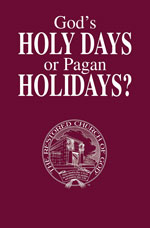At this time of the year, true Christians are deluged with Christmas music, commercials and invitations to parties.
Shortly after Christmas is another holiday we do not celebrate; but we may not realize why. Have you ever been confronted about not attending a New Yearâs party and were unsure how to answer? The reasonsâproofsâare important to keep fresh in our minds.
True Christians carefully hold fast to the same truths, teachings and traditions that Jesus Christ taught His apostles to pass on to the New Testament Church (Matt. 28:18-20). We are to abstain from the âeat-drink-and-be-merry-for-tomorrow-we-dieâ attitude.
This is very different from the vast majority of professing âChristiansâ who see nothing wrong with observing New Yearâs.
Wild New Yearâs celebrations have been taking place for millennia. In early times, the ancient Romans gave each other New Yearâs gifts of branches from sacred trees. In later years, they gave gold-covered nuts or coins imprinted with pictures of Janus, the false god of gates, doors and beginnings. January was named after Janus, who had two facesâone looking forward and the other backward.
The God we serve âis not the author of confusion, but of peaceâ (I Cor. 14:33). The original Greek word used here for confusion also means âinstability, disorder, commotion, tumultââwords that perfectly describe New Yearâs history.
Not only is its history chaotic, but so is the holiday itself. For some reason, people tend to let go of all inhibitionâand many times self-respectâand simply go wild on New Yearâs. They drink too much, âhooking upâ with people they barely know, for quick affairs that yield life-long repercussions.
Even more than the disorder, instability and confusion that is New Yearâs, God hates this holiday because of its pagan roots. Notice Jeremiah 10:2-3: âLearn not the way of the heathenâŚfor the customs of the people are vain.â This is a command. Throughout His Word, God describes âheathenâ as those who worship nature (the sun, moon, stars, trees, etc.), manmade idols or anything but the one true God. True Christians understand that God hates customs, practices and traditions that have pagan worship origins.
How serious is God about paganism? When He rescued the twelve tribes of Israel from Egypt and led them out of brutal slavery, He commanded them, âAfter the doings of the land of Egypt, wherein you dwelt, shall you not do: and after the doings of the land of Canaan, where I bring you, shall you not do: neither shall you walk in their ordinancesâ (Lev. 18:3). God demanded the Israelites to not defile themselves with the practices and customs of the surrounding pagan nations (vs. 24-29). âTherefore shall you keep My ordinance, that you commit not any one of these abominable
customs, which were committed before you, and that you defile not yourselves therein: I am the Lord your Godâ (vs. 30).
It should be our lifeâs mission to live by Godâs Word aloneânot by the traditions of men, including pagan New Yearâs celebrations!
When God instituted the Passover to Israel, He also revealed His sacred calendar (Ex. 12:2). Christians understand what days we are commanded to observe: Passover, Days of Unleavened Bread, Feast of Pentecost, Feast of Trumpets, Day of Atonement, Feast of Tabernacles, and Last Great Day, all clearly projected in Godâs sacred calendar. Christ kept them, and so did the apostles (Matt. 26:17-19, 26-28; 28:18-20; I Cor. 5:6-8).
Both New Yearâs Eve and New Yearâs Day originate from a pagan, Satan-influenced world. They were designed to deceive mankind by appealing to fleshly, carnal desiresâor, as the Bible calls them, the works of the flesh: âNow the works of the flesh are manifest, which are these: adultery, fornication, uncleanness, lasciviousness, idolatry, witchcraft, hatred, variance, emulations, wrath, strife, seditions, heresies, envyings, murders, drunkenness, revelings, and such likeâ (Gal. 5:19-21). These describe well all that transpires during New Yearâs celebrations.
At the end of verse 21, we read the ârewardâ of those who practice fleshy, carnal desires. Notice: âThey which do such things shall not inherit the kingdom of God.â
















